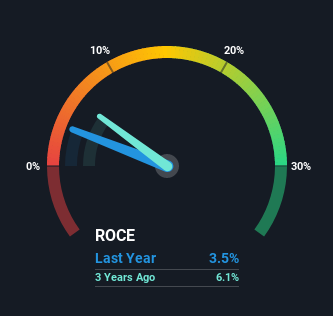- United States
- /
- Diversified Financial
- /
- NasdaqGS:CASS
Be Wary Of Cass Information Systems (NASDAQ:CASS) And Its Returns On Capital

If you're not sure where to start when looking for the next multi-bagger, there are a few key trends you should keep an eye out for. One common approach is to try and find a company with returns on capital employed (ROCE) that are increasing, in conjunction with a growing amount of capital employed. Basically this means that a company has profitable initiatives that it can continue to reinvest in, which is a trait of a compounding machine. Although, when we looked at Cass Information Systems (NASDAQ:CASS), it didn't seem to tick all of these boxes.
What is Return On Capital Employed (ROCE)?
Just to clarify if you're unsure, ROCE is a metric for evaluating how much pre-tax income (in percentage terms) a company earns on the capital invested in its business. Analysts use this formula to calculate it for Cass Information Systems:
Return on Capital Employed = Earnings Before Interest and Tax (EBIT) ÷ (Total Assets - Current Liabilities)
0.035 = US$31m ÷ (US$2.2b - US$1.3b) (Based on the trailing twelve months to March 2021).
Thus, Cass Information Systems has an ROCE of 3.5%. Ultimately, that's a low return and it under-performs the IT industry average of 11%.
Check out our latest analysis for Cass Information Systems

Historical performance is a great place to start when researching a stock so above you can see the gauge for Cass Information Systems' ROCE against it's prior returns. If you want to delve into the historical earnings, revenue and cash flow of Cass Information Systems, check out these free graphs here.
How Are Returns Trending?
In terms of Cass Information Systems' historical ROCE movements, the trend isn't fantastic. To be more specific, ROCE has fallen from 4.9% over the last five years. And considering revenue has dropped while employing more capital, we'd be cautious. This could mean that the business is losing its competitive advantage or market share, because while more money is being put into ventures, it's actually producing a lower return - "less bang for their buck" per se.
On a separate but related note, it's important to know that Cass Information Systems has a current liabilities to total assets ratio of 60%, which we'd consider pretty high. This can bring about some risks because the company is basically operating with a rather large reliance on its suppliers or other sorts of short-term creditors. While it's not necessarily a bad thing, it can be beneficial if this ratio is lower.
Our Take On Cass Information Systems' ROCE
In summary, we're somewhat concerned by Cass Information Systems' diminishing returns on increasing amounts of capital. In spite of that, the stock has delivered a 18% return to shareholders who held over the last five years. Either way, we aren't huge fans of the current trends and so with that we think you might find better investments elsewhere.
If you're still interested in Cass Information Systems it's worth checking out our FREE intrinsic value approximation to see if it's trading at an attractive price in other respects.
While Cass Information Systems may not currently earn the highest returns, we've compiled a list of companies that currently earn more than 25% return on equity. Check out this free list here.
If you’re looking to trade Cass Information Systems, open an account with the lowest-cost* platform trusted by professionals, Interactive Brokers. Their clients from over 200 countries and territories trade stocks, options, futures, forex, bonds and funds worldwide from a single integrated account. Promoted
New: AI Stock Screener & Alerts
Our new AI Stock Screener scans the market every day to uncover opportunities.
• Dividend Powerhouses (3%+ Yield)
• Undervalued Small Caps with Insider Buying
• High growth Tech and AI Companies
Or build your own from over 50 metrics.
This article by Simply Wall St is general in nature. It does not constitute a recommendation to buy or sell any stock, and does not take account of your objectives, or your financial situation. We aim to bring you long-term focused analysis driven by fundamental data. Note that our analysis may not factor in the latest price-sensitive company announcements or qualitative material. Simply Wall St has no position in any stocks mentioned.
*Interactive Brokers Rated Lowest Cost Broker by StockBrokers.com Annual Online Review 2020
Have feedback on this article? Concerned about the content? Get in touch with us directly. Alternatively, email editorial-team (at) simplywallst.com.
About NasdaqGS:CASS
Cass Information Systems
Provides payment and information processing services to manufacturing, distribution, and retail enterprises in the United States.
Flawless balance sheet established dividend payer.
Similar Companies
Market Insights
Community Narratives



